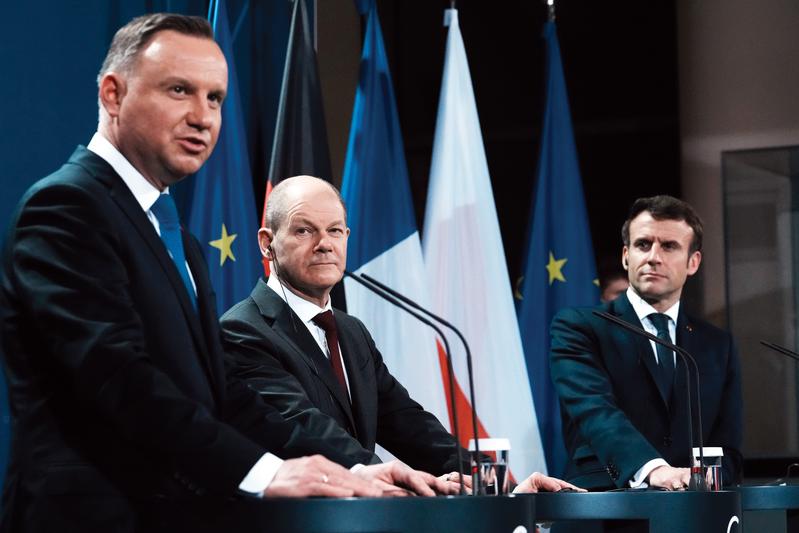 Polish President Andrzej Duda (left), German Chancellor Olaf Scholz (center) attend a joint news conference with French President Emmanuel Macron on Feb 8 in Berlin. (THIBAULT CAMUS / AP)
Polish President Andrzej Duda (left), German Chancellor Olaf Scholz (center) attend a joint news conference with French President Emmanuel Macron on Feb 8 in Berlin. (THIBAULT CAMUS / AP)
High-level diplomatic efforts to defuse the tensions around Ukraine have been stepped up in recent weeks, with Western leaders engaging in rounds of meetings over the Ukraine-Russia crisis.
The leaders of France and Germany have been engaging in shuttle diplomacy in a bid to de-escalate the tensions surrounding Ukraine that amount to the biggest crisis between Russia and the West since the end of the Cold War.
Following visits to Moscow and Kiev on Feb 7 and Feb 8, respectively, French President Emmanuel Macron met with German Chancellor Olaf Scholz on Feb 7 in Berlin. In a joint news conference, Macron reaffirmed that pursuing dialogue with Russia is “the only path that will make peace possible in Ukraine”.
Scholz, who had just returned from Washington where he had talks with US President Joe Biden, threatened a “united and decisive” response to Russia if Ukraine is invaded. He stressed the primacy of diplomacy in maintaining peace.
Relations between Ukraine and Russia have further deteriorated recently, with both sides massing large numbers of military personnel and equipment along their borders.
Speaking to the European Parliament in January, Macron noted that France, together with Germany, would continue to seek a political solution to the Ukraine conflict within the Normandy Format. The diplomatic arrangement, set up in 2014, gathers France, Germany, Russia and Ukraine in efforts to broker a peaceful solution.
On Feb 7, Macron held a five-hour discussion with Russian President Vladimir Putin over the Ukraine crisis. France holds the rotating presidency of the Council of the European Union.
After their talks, Putin said that Russia’s core concerns on security have been ignored by the United States and NATO, adding that the military alliance has attempted to lecture Russia on where and how to place its armed forces.
Putin reiterated Russia’s opposition to NATO’s eastward expansion, adding that Kiev refuses to comply with the 2015 Minsk agreements on a peaceful settlement of the Ukrainian issue and is even attempting to dismantle the deals.
Several Western countries have accused Moscow of having amassed troops near the Ukrainian border, stoking fears of a Russian “invasion”.
Moscow denied the accusation, saying that Russia has the right to mobilize troops within its borders to defend its territory as NATO’s activities constitute a threat to Russia’s border security. However, Putin called some of Macron’s proposals on security “realistic”.
Macron told French media that Putin assured him of “his desire to maintain the stability and territorial integrity of Ukraine”.
He said it would take time to find a diplomatic solution, and Putin told him that Moscow would not further escalate the Ukraine crisis.
After his talks with Ukrainian President Volodymyr Zelensky in Kiev on Feb 8, Macron said France will continue to work with Germany to mediate in the crisis.
Macron said that Zelensky had expressed his willingness to implement the Minsk agreements reached in 2014 and 2015, which envisaged a ceasefire, a withdrawal of heavy weaponry from the demarcation line, a prisoner exchange and local elections, among other measures.
At a news conference with Macron, Zelensky voiced his hope that the next meeting of leaders of the Normandy Four, which includes Ukraine, France, Germany and Russia, would take place “in the near future.”
Scholz’s Washington trip, his first as German chancellor, was dominated by the Ukraine crisis.
Scholz proposed a dual-track approach to the Ukraine tensions, to “intensively work on preparing possible sanctions together” while using “all diplomatic means”. He also plans to visit Kiev and Moscow a week after Macron’s tour.
After meeting with Putin, Macron said that the trip was aimed at helping to avoid “any further escalation, to open new perspectives, to trigger a new dynamic”, French newspaper Le Figaro reported.
But none of the parties — Russia, Ukraine, France, Germany, the US and NATO — has compromised on the key issue: The possible future membership of Ukraine in NATO.
Speaking to Le Figaro, Jean-Marie Guehenno, former UN undersecretary-general for peacekeeping operations, described NATO’s nonstop enlargement as a mistake.
Elwin de Groot, head of macro strategy at Dutch banking company Rabobank, warned that the geopolitical tensions over Ukraine “are already affecting the eurozone economy, because of the high gas and energy prices” across the EU.


